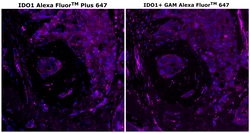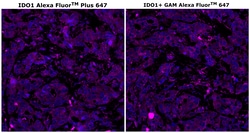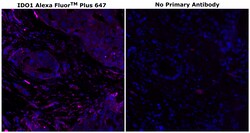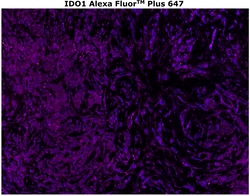Learn More
Invitrogen™ IDO Monoclonal Antibody (V1NC3IDO), Alexa Fluor™ Plus 647
Mouse Monoclonal Antibody
Supplier: Invitrogen™ 756975094

Description
Description: The monoclonal antibody V1NC3IDO recognizes human IDO. IDO (indoleamine-2,3-dioxygenase, INDO, IDO1) is an intracellular enzyme that catalyzes the degradation of tryptophan to kynurenines. IDO is expressed in a wide variety of tissues and cells, including macrophages, plasmacytoid dendritic cells, and several cell lines. IDO can be induced in many different cell types by IFN gamma or other inflammatory stimuli. Expression of IDO in antigen presenting cells and tumors is thought to mediate immune suppression through depletion of this essential amino acid and/or by the creation of tryptophan metabolites that cause apoptosis of T cells and induction of regulatory T cells. This V1NC3IDO antibody reacts with IDO1 and does not cross react with IDO2. Applications Reported: This V1NC3IDO antibody has been reported for use in immunohistochemical staining of formalin-fixed paraffin embedded tissue sections. Applications Tested: This V1NC3IDO antibody has been tested by immunohistochemistry on formalin-fixed paraffin embedded human tissue using high pH antigen retrieval and can be used at 20 μg/mL. It is recommended that the antibody be carefully titrated for optimal performance in the assay of interest. Using conjugate solutions: Centrifuge the protein conjugate solution briefly in a microcentrifuge before use; add only the supernatant to the experiment. This step will help eliminate any protein aggregates that may have formed during storage, thereby reducing nons...
IDO1 is an intracellular heme-containing enzyme that catalyzes the oxidative cleavage of the indole ring of several important regulatory molecules like tryptophan, serotonin, and melatonin. By doing this, IDO1 initiates the production of biologically active metabolites, commonly referred to as kynurenines. IDO1 is widely expressed in a variety of human tissues as well as in macrophages and dendritic cells (DCs). In inflammation, interferons (IFNs) act on specific receptors to trigger IDO1 induction. The production of IFN-gamma and induction of IDO1 represent important antimicrobial mechanisms. Degradation and depletion of tryptophan by IDO1 inhibits the growth of viruses, bacteria and parasites. Furthermore, IDO1 plays a complex and crucial role in immunoregulation during infection, pregnancy, autoimmunity, transplantation, and neoplasia.
Specifications
| IDO | |
| Monoclonal | |
| 0.2 mg/mL | |
| PBS with 0.5% BSA, 10% proprietary stabilizer and 0.05% sodium azide; pH 7.2 | |
| P14902 | |
| Ido1 | |
| Affinity chromatography | |
| RUO | |
| 3620 | |
| 4°C, store in dark | |
| Liquid |
| Immunohistochemistry (Paraffin) | |
| V1NC3IDO | |
| Alexa Fluor Plus 647 | |
| Ido1 | |
| EC 1.13.11.52; IDO; IDO1; IDO-1; INDO; indolamine 2,3 dioxygenase; indole 2,3-dioxygenase; indoleamine; indoleamine 2,3-dioxygenase 1; indoleamine 23-dioxygenase; Indoleamine-2; indoleamine-pyrrole 2,3 dioxygenase; indoleamine-pyrrole 2,3-dioxygenase | |
| Mouse | |
| 500 μL | |
| Primary | |
| Human | |
| Antibody | |
| IgG2b κ |
The Fisher Scientific Encompass Program offers items which are not part of our distribution portfolio. These products typically do not have pictures or detailed descriptions. However, we are committed to improving your shopping experience. Please use the form below to provide feedback related to the content on this product.



